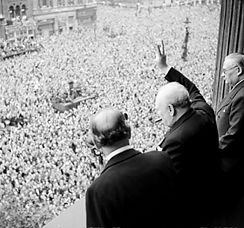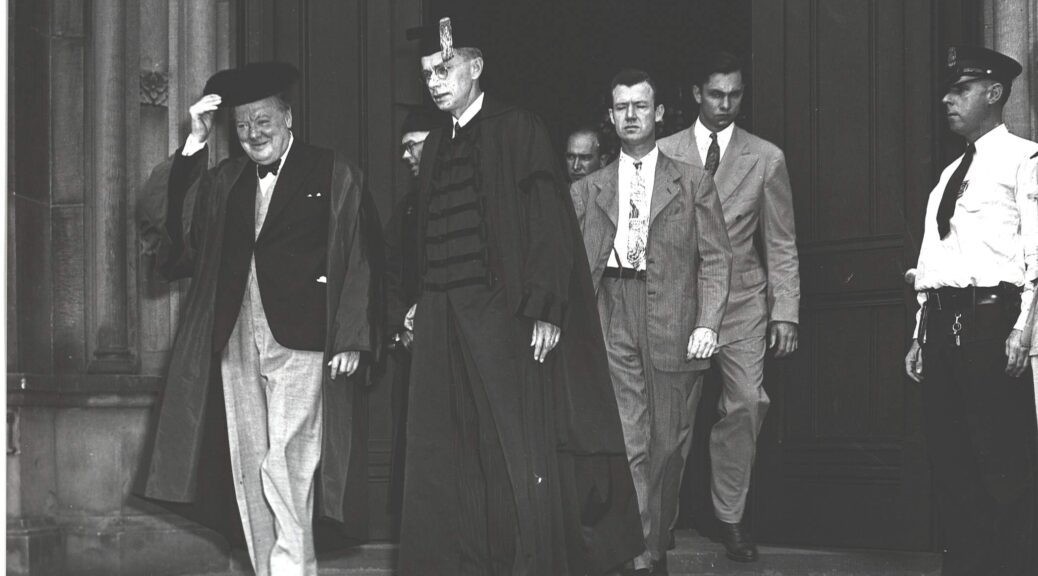


Unless Mr. Hodgson has found a new attribution, that charmer is not Churchill’s. It’s listed in the “Red Herrings” appendix in Churchill by Himself, page 575, with this note:
Repeatedly attributed to everyone from Woodrow Wilson’s physician to Ronald Reagan. “Clergyman Henry Ward Beecher (1813–87) is one person to whom the thought was attributed in his time.…This quotation is now going around the web, broadly attributed to Churchill. Is it accurate? “Socialism is a philosophy of failure, the creed of ignorance, and the gospel of envy, its inherent virtue is the equal sharing of misery.” —M.S. via email.
It is more or less correct, but it’s a truncated version of two separate comments, run together to make them more interesting (in the eye of the drafter).
“Socialism is the philosophy of failure, the creed of ignorance, and the gospel of envy.” —Perth, Scotland, 28 May 1948, in Churchill, Europe Unite: Speeches 1947 & 1948 (London: Cassell, 1950), 347.…
Happy 4th from Hillsdale College.
“The Third Great Title-Deed of Anglo-American Liberties”
Winston S. Churchill, Liberty Day Meeting, Central Hall, Westminster, July 4, 1918. Excerpted from Robert Rhodes James, Winston S. Churchill: His Complete Speeches 1897-1963, 8 vols. (New York: Bowker, 1974), III 2613-16.
I move that the following resolution be cabled from the meeting as a greeting to the President and people of the United States of America: This meeting of the Anglo-Saxon Fellowship assembled in London on the 4th of July, 1918, sends to the President and people of the United States their heartfelt greetings on the 142nd anniversary of the Declaration of American Independence.…

Young Winston Churchill’s second speech in Parliament was a bravura performance taking up his father’s theme for economy in the budget.
In Churchill in His Own Words (p 45) I date this quotation 12 May 1901 and cite Churchill’s Mr. Brodrick’s Army, his 1903 volume of speeches (facsimile edition, Sacramento: Churchilliana Company, 1977), 16:
Wise words, Sir, stand the test of time, and I am very glad the House has allowed me, after an interval of fifteen years, to raise the tattered flag I found lying on a stricken field.
The “tattered flag” was Lord Randolph Churchill’s campaign for economy in the late 1880s.…
Imagine if the President of the United States declared, “We will dig out terrorists ‘like rats in a hole.” Many would applaud and think maybe they had misjudged him. Or would they?
A colleague sends an exchange in the House of Commons on 7 March 1916. “Colonel Churchill,” recently returned from the Front but still a Member of Parliament, was speaking about the naval war with Germany. British naval planners must provide, Churchill was saying,
against what will be a continually increasing element of the unknown. I must also just point out another argument which shows that, great as were the anxieties with which we were faced in the first four months of the War, they have not by any means been removed, or, indeed, sensibly diminished by the course of events.…
(Or: “Churchillian Drift,” Part 1,398….)
On the eve of the British General Election, Metro UK declares: “Winston Churchill said the best argument against democracy is a five-minute conversation with the average voter.”
This is alas a reappearance of an ever-popular red-herring quote that Churchill never said.
Churchill had thoughtful critiques of democracy. See in particular his essay on “Mass Effects in Modern Life” in his book, Thoughts and Adventures. But he also had more respect for the average voter than this non-quote suggests. In the House of Commons on 31 October 1944 he said:
At the bottom of all the tributes paid to democracy is the little man, walking into the little booth, with a little pencil, making a little cross on a little bit of paper [we still vote that way in New Hampshire]—no amount of rhetoric or voluminous discussion can possibly diminish the overwhelming importance of that point.…
(Or: “You Haven’t Looked Hard Enough”)
“The Untold Story of Mussolini’s Fake Diaries” (Daily Beast, 12 April 2015) evaluates Mussolini’s supposed diaries, letters or documents peddled over the years, while raising some incriminating charges, or suppositions, about Winston Churchill:
Before the war, Churchill offered Il Duce a deal. After the war, British intelligence tried to destroy their correspondence…. When Churchill became prime minister in May 1940 he tried, in a series of letters, to dissuade Mussolini from joining the Axis powers. He was ignored. Three weeks later Italy joined Nazi Germany and declared war on Great Britain.…
Part 5: Loyalty
Churchill had “a reputation for brusqueness strengthened by his handling of the common folk,” his postwar bodyguard Ronald Golding continued.
He had the habit of summing people up after two sentences of conversation. They were classified, it seemed to me, as either “interesting” or “uninteresting.” With the former, conversation ensued; with the latter, Churchill would ignore them. On such occasions Mrs. Churchill frequently came to the rescue, engaging the luckless in conversation. If they were tongue-tied she would do most of the talking until it was time for them to leave.…